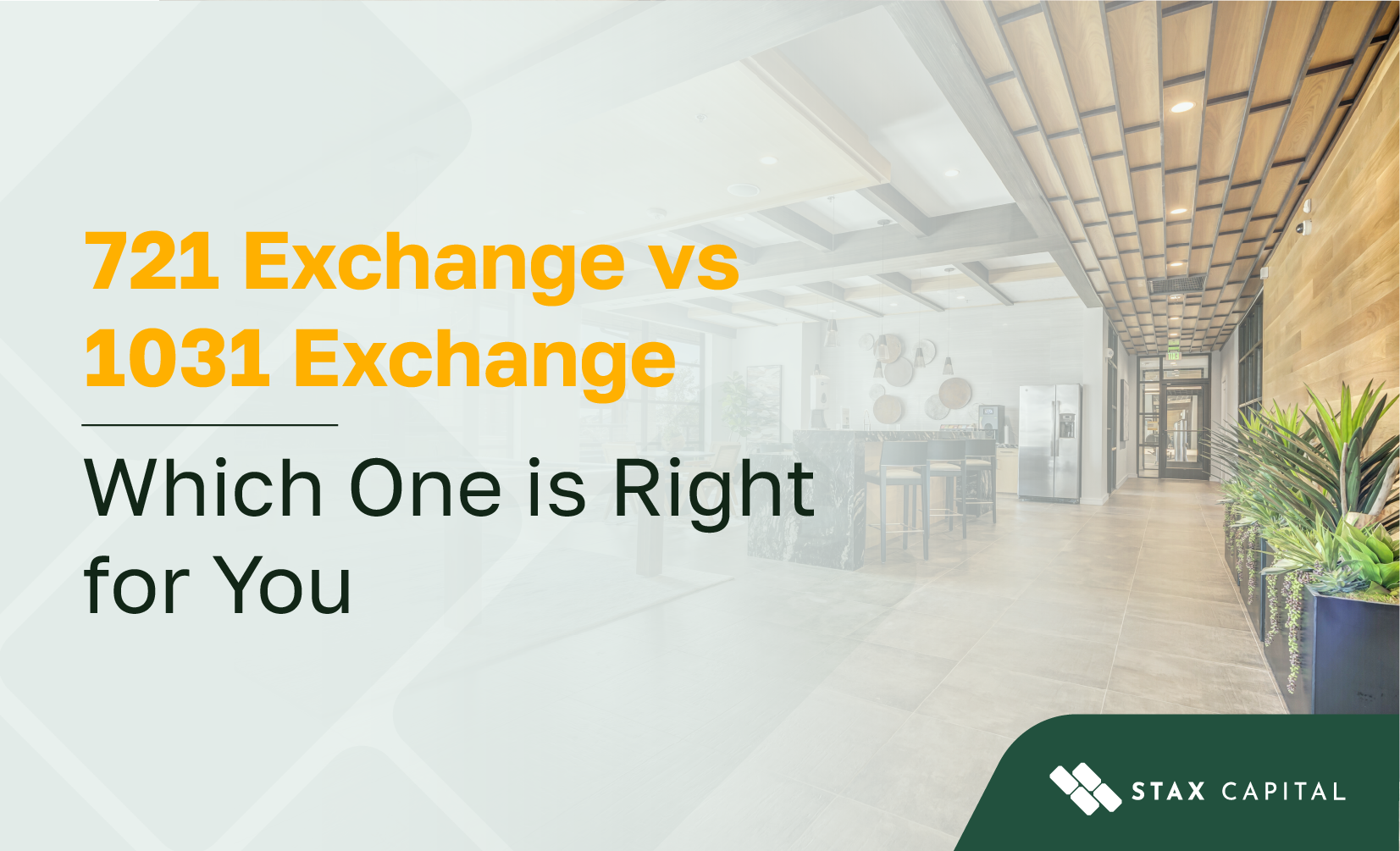721 Exchange Rules: What Every Real Estate Investor Should Know

What if you could exchange your real estate for ownership in a professionally managed real estate portfolio while deferring capital gains taxes?
A 721 Exchange allows you to do exactly that—provided the transaction follows IRS rules. This strategy allows investors to trade real estate for REIT ownership, unlocking diversification, passive income, and tax deferral. However, taxes are deferred, not eliminated, and become payable upon conversion of OP Units into REIT shares.
Here are key rules you need to know before making the move. Let’s break it down.
Key Rules & Requirements of a 721 Exchange
A 721 Exchange helps real estate investors defer capital gains taxes. It works by swapping a property for Operating Partnership (OP) Units in an UPREIT (Umbrella Partnership Real Estate Investment Trust). This strategy lets investors move from direct property ownership to passive real estate investment while diversifying their portfolio.
But not all properties qualify. Strict rules apply, and investors must follow specific guidelines. Below, we break down the key requirements, ownership structures, and restrictions to know before using a 721 Exchange.
What Types of Properties Qualify for a 721 Exchange?
For a 721 Exchange to be eligible, the property must meet certain criteria. This exchange lets investors defer taxes, but not all properties are eligible. Only certain types can be converted into Operating Partnership (OP) Units. Understanding these limits is key to making the most of this strategy.
Eligible Properties:
- Investment Real Estate – Investment real estate, such as rental properties, commercial buildings, and multi-family units typically qualify for a 721 Exchange.
- Income-Producing Assets – The property should generate ongoing income. For example, multi-family apartment buildings, shopping centers, or office buildings that produce rental income.
Ineligible Properties:
- Personal-use Property – Your primary residence, second homes, or vacation homes are not eligible for a 721 Exchange. The exchange only applies to real estate held for investment purposes.
- Raw Land – While some UPREITs may accept land, others may not. If you are thinking about exchanging vacant land or land that isn’t generating rental income, be sure to confirm whether it meets the eligibility requirements of the UPREIT.
To qualify, you must exchange your property for Operating Partnership (OP) Units in an UPREIT. Once exchanged, you no longer own physical real estate. Instead, you hold shares in the REIT's portfolio.
One key rule: You must contribute the property directly to the UPREIT. A 1031 Exchange won’t work once you convert to REIT shares.
Rules for exchanging real estate for OP Units
The 721 Exchange isn’t about selling property for cash. Instead, it’s about converting real estate into Operating Partnership (OP) Units. Here’s how it works:
- Direct Property Contribution – In a 721 Exchange, you transfer ownership of your real estate property to a UPREIT. In return, you receive OP Units, which give you ownership in the REIT, not the individual properties.
- Tax Deferral – The IRS allows you to defer capital gains taxes on your property sale, as long as you exchange it for OP Units instead of cash or other property. This is similar to a 1031 Exchange, but instead of swapping one property for another, you’re entering a new form of investment.
- No Boot Allowed – Unlike a 1031 Exchange, a 721 Exchange has a key restriction: no “boot.” Boot is cash or non-qualifying property. In a 721 Exchange, everything must be property for property. If you receive cash, it triggers capital gains taxes.
By contributing your property to an UPREIT, you defer taxes and shift from owning property directly to holding OP Units in a REIT. However, distributions are not guaranteed, and you lose control over property management and sales decisions. Your returns depend on the REIT’s performance and market conditions.
Understanding ownership structure and restrictions
Once you complete the 721 Exchange, you no longer directly own the physical property. Instead, you own OP Units in the REIT, which gives you exposure to the REIT’s portfolio of properties. Here's what to know about the ownership structure and its restrictions:
- Ownership of OP Units – OP Units work like shares of stock, but instead of owning a single property, you own a fraction of a professionally managed real estate portfolio. Your investment grows or declines based on the REIT’s overall performance rather than a single property’s value.
- Loss of Direct Control – In a 721 Exchange, you give up the ability to make individual property decisions. Unlike when you own real estate directly, the REIT’s management team makes decisions about property sales, acquisitions, and management. You no longer have any say in how individual properties are managed or sold.
- Dividends and Distributions – As an investor in the REIT, you can receive regular income payments (dividends) based on the performance of the REIT’s properties. These payments are often made quarterly or monthly.
- Limited Liquidity – OP Units are not publicly traded and cannot be sold like traditional stocks. While some UPREITs allow conversions into REIT shares after a lock-up period (typically one to two years), timing and liquidity options depend on the specific REIT's policies. Investors should carefully evaluate the liquidity constraints before entering a 721 Exchange.
While you gain passive income, it’s important to understand that you are no longer actively managing the investment. This is a trade-off between diversification and control.
Lock-in periods and when investors can convert OP Units into REIT shares
After you exchange your real estate for OP Units in a 721 Exchange, you may be wondering when you can turn those OP Units into REIT shares. Here’s what you need to know about the lock-in periods and conversion rules:
- Lock-In Period – Most UPREITs require investors to hold their OP Units for a certain period of time—typically one to two years—before they can convert those units into publicly traded REIT shares. This lock-in period ensures that the REIT’s investors are committed long-term and provides the REIT with stability.
- Conversion to REIT Shares – After the lock-up period, investors may have the option to convert OP Units into publicly traded REIT shares. However, this conversion triggers capital gains taxes, which are calculated based on the property's original cost basis and appreciation. Investors should consult a tax professional to evaluate their individual tax liability.
- Tax Implications of Conversion – When OP Units are converted into REIT shares, the tax deferral ends. You’ll be required to pay capital gains tax on the appreciation of your property from the time you acquired it until the time of conversion. It’s important to understand that taxes are only deferred, not eliminated.
Understanding the lock-in period and conversion rules is critical for planning your investment strategy. If you are relying on the income from the REIT, you may not want to convert your OP Units into shares too quickly. On the other hand, if you need liquidity, you’ll want to make sure you’re prepared for the conversion after the lock-up period expires.
Ready to Take the Leap?
Shifting from hands-on property management to passive investing is a big step. A 721 Exchange can help you defer taxes and diversify your portfolio. But it also has risks—like liquidity limits and tax liabilities when you convert.
Before making a move, speak with a tax or financial advisor to see if this strategy fits your goals.
Want to explore your options? Contact our team today.



Share: